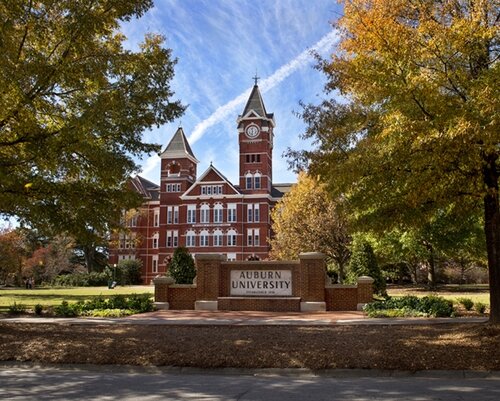Auburn University students honoured with National Science Foundation Fellowships
Four Auburn University undergraduate students have won National Science Foundation, or NSF, Graduate Research Fellowships, or GRFP, for graduate study in the fall.
The purpose of the fellowship program is to help ensure the vitality and diversity of the scientific and engineering workforce in the United States. Each fellowship consists of three years of support accessible over a five-year period. The NSF provides a stipend of $34,000 to the fellow and a cost-of-education allowance of $12,000 to the degree-granting institution.
“We are especially happy to see a continuation of Auburn students being awarded this prestigious fellowship,” said Tiffany Sippial, director of the Auburn University Honors College. “The NSF GRFP recognizes student potential for significant achievements in science and engineering research, and these awards are a perfect fit for the work being done at Auburn University.”
The following have been selected as NSF GRFP recipients for 2023:
Katie Leonard will graduate from Auburn in May with a bachelor’s degree in chemical engineering and minors in dance and sports coaching from the Samuel Ginn College of Engineering and the College of Education, respectively.
Leonard’s research is focused on drug delivery. She studies different therapeutic mechanisms to deliver drugs, such as chemotherapies. The goal of her research is to increase circulation time while mitigating the side effects of the drug.
“I am shocked and honored to be awarded a fellowship with NSF. I want to say thanks to the chemical engineering department at Auburn University for providing me with a well-rounded education and support,” said Leonard. “I am beyond excited to continue my education in the Ph.D. program of chemical and biomolecular engineering at Rice University in Houston.”
A native of Auburn, Alabama, and a Goldwater Scholar, Peter Abraham will graduate from Auburn with a bachelor’s degree in chemical engineering and a minor in computer science from the Samuel Ginn College of Engineering.
His NSF-funded research project, titled “Understanding Macrophage Phenotype in Obesity-linked Colorectal Cancer using Tissue-Engineered Models,” involves investigating a cell in the body called the macrophage. Abraham explains that, “In obesity, macrophages contribute to chronic inflammation, while in cancer, macrophages in the tumor are not inflammatory and actually promote tumor progression. Considering that obesity is linked to colorectal cancer, I wanted to look at the way macrophages behave in the context of both conditions.”
Abraham works with Elizabeth Lipke, the Mary and John H. Sanders Endowed Professor of Chemical Engineering, and Michael Greene, associate professor of nutrition in the College of Human Sciences.
“I am elated to receive the fellowship and am truly grateful for my advisors and the many mentors that have contributed to this accomplishment,” said Abraham.
Claire Bailey, an Honors College student originally from Tupelo, Mississippi, will be graduating in May, receiving her bachelor’s degree in organismal biology in the College of Sciences and Mathematics
Bailey’s research project, titled “Honey Bees Potentially Repurpose Their Precious Wax,” involves investigating the relationship between eusocial organisms and their nests as she begins graduate school this fall. Bailey explains, “I look at subtle changes in honey bee nest architecture and outline an experiment to determine whether the bees are recycling the small bits of wax along the outer edges of their comb.”
Bailey works with Michael Smith, assistant professor in the Department of Biological Sciences.
“I am incredibly honored to have been awarded the NSF GRFP and am thankful for Auburn University and those at the Smith Bee Lab who have supported me throughout my undergraduate education,” said Bailey.
Harrison Estes, an Honors College student, will be graduating in May with a bachelor’s degree in applied biotechnology in the College of Agriculture.
Originally from Pike Road, Alabama, Estes will begin his doctoral program in genetics at the University of Wisconsin-Madison this fall. His research will explore fungal metabolism for application in medicine, agriculture, pharmaceuticals and bioenergy.
In his research, titled “The Chemical Ecology of Siderophores in the Relationship of Aspergillus fumigatus and Pseudomonas aeruginosa,” Estes will consider siderophores in the relationship between Aspergillus fumigatus and Pseudomonas aeruginosa, where little is known about their role in contributing toward metabolism in both competition and symbiosis with each other. Estes explains that “this research has a major impact on understanding the chemical ecology of these common infections of immunocompromised individuals, especially those in the cystic fibrosis community.”
At Auburn, Estes works with Jeffrey Coleman, associate professor and graduate program officer in entomology and plant pathology.
“Winning the NSF GRFP is an exciting achievement that I could not have done without the support of my mentors Dr. Jeff Coleman and Dr. John Beckmann at Auburn University, Dr. Jason Slot and Dr. Tom Mitchell at The Ohio State University and Dr. Nancy Keller at UW-Madison,” said Estes. “My undergraduate research experience at Auburn under Dr. Coleman, paired with my education from the College of Agriculture and Honors College, helped lay a foundation for which I could not be more thankful. Auburn University has set me up for success, and I will be a proud Auburn alumnus my entire life. War Eagle!”

